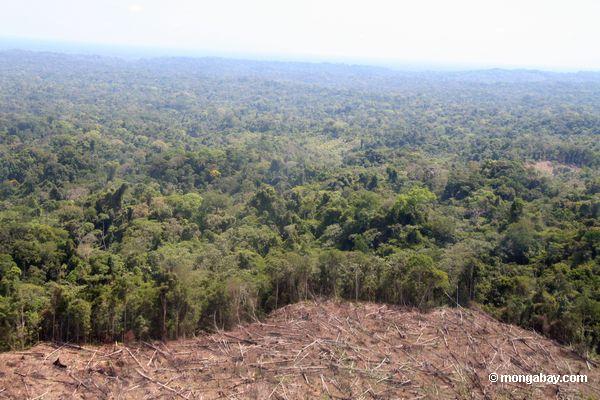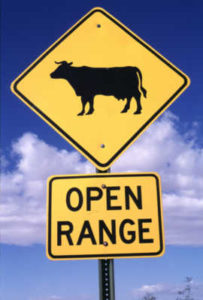You don't need to be a complete vegetarian for your diet to help protect the planet. Just eat less meat. Here's why:
1. Save the rainforest. World Wildlife Fund estimates that, every year, an area of the world’s rain forests larger than the state of New York is destroyed to create grazing land. In Latin America, where the picture on the right was taken, the United Nations says some 70% of forests in the Amazon basin have been cut down to raise cows.

2. Refresh the air. If you’ve ever driven by a feed lot, you’ve probably had to hold your nose. No wonder. About 1.4 billion metric tons of solid manure are produced by U.S. farm animals each year – 130 times the quantity produced by people.This figure includes pigs and chickens as well as cattle, but cattle are the single largest source.
3. Keep water clean. Two-thirds of the beef cattle raised in the U.S. are fattened up using hormones like steroids, testosterone and progesterone. When the cows pee, they can pollute surface and ground water with all these chemicals, affecting the ability of frogs and fish to reproduce, too.
4. Save water. It takes 600 gallons of water to produce one hamburger patty. Just one.
5. Feed more people. It takes about 2 pounds of grain to produce a quarter-pound of burger meat. Why not convert that grain (and the resources used to grow it) into food more people can eat?
 6. Stop climate change. “Hamburgers are the Hummers of food” when it comes to climate change, say scientists. Switching from steak to salad could cut as much carbon as leaving the car home a couple of days a week. Food is the third largest contributor to the average household’s carbon footprint after driving and utilities. If people simply cut their meat intake from the average 90 kg/year to 53 kg/yr, meat-associated carbon emissions would drop by 44 percent.
6. Stop climate change. “Hamburgers are the Hummers of food” when it comes to climate change, say scientists. Switching from steak to salad could cut as much carbon as leaving the car home a couple of days a week. Food is the third largest contributor to the average household’s carbon footprint after driving and utilities. If people simply cut their meat intake from the average 90 kg/year to 53 kg/yr, meat-associated carbon emissions would drop by 44 percent.
7. Be nice. Many livestock and dairy cattle are raised in cruel and inhumane conditions where they must be injected with antibiotics so they’ll fatten up and seem healthy. The Union of Concerned Scientists reports that about 70% of all antibiotics made in the U.S. are used to fatten up livestock.
8. Avoid drugs. In addition to hormones and antibiotics, conventional meat producers routinely process their products using chemical additives and preservatives like phosphates and sodium nitrites. That makes them pinker, but not necessarily healtheir. Sodium nitrites may react with amino acides to form carvinogenic nitrosamines; various studies have found a link between high processed-meat consumption and colon cancer, possibly attributable to prservatives like sodium nitrite.
9. Live longer. Speaking of health, eating a lot of meat can increase the likelihood of heart attacks and high blood pressure.
10. Save money. Meat is usually the most expensive item you put in your shopping cart. Buy less meat, and shift the savings to organic fruits and vegetables.
Here’s a good rundown on what it costs in water, energy and resources to eat a hamburger (and fries) at a fast food restaurant.









